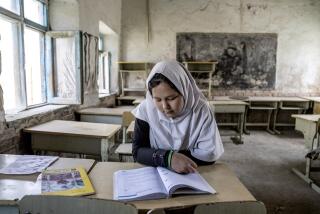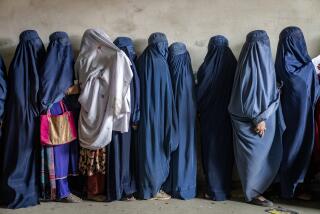Traditional Dress, Roles Discarded : Young Afghan Women Emerging From Shadows
- Share via
KABUL, Afghanistan — At Kabul University and in a village on the outskirts of the capital, young women are breaking away from the traditional dress and roles to which they were restricted until recently.
Unlike nearby South Asian and Middle Eastern countries, it is not uncommon to see women in modern, albeit modest, Western clothes conversing in the street with other women covered from head to toe in the traditional Afghan chadri.
At Kabul University, young women talk openly of their plans for careers in teaching. In Char Asiab, outside the city, a teen-ager explains how she will take a bus to the city to work in a factory.
This is a sharp contrast to tradition in Muslim Afghanistan--and to neighboring Pakistan, where very few women are seen in public without traditional dress. In the Afghan refugee camps of Pakistan, purdah, the tradition of secluding women, remains strong and women rarely appear in public.
Not Always Tolerant
Kabul was not always so tolerant. When Emir Amanullah tried in the 1920s to follow the example of Turkish leader Kemal Ataturk and modernize Afghanistan, he was quickly overthrown. Even as recently as 1959, when Prime Minister Mohammed Daoud and his Cabinet ministers appeared on a public platform accompanied by their unveiled wives, it was a major shock.
Although Daoud was overthrown, his reformist zeal is a frequent theme in discussions within the People’s Democratic Party of Afghanistan, as the ruling Communist Party is called. It is not surprising, then, that many women--and young people--are supporters of the ruling party.
“The revolution did have a lot of support among Kabul and middle-class youth,” one Western observer said. “They saw it as a vehicle to break old strictures, to choose mates, to see movies, to do some of the things they saw on television.”
Afghan Red Crescent leader Soraya is a longtime party worker who believes strongly in what the Afghan revolution has done for women.
Years of Oppression
“Years ago there were no equal rights between men and women,” she said. “Women were even sold for marriage. There were no chances for women to work, so they stayed in their houses, maybe only coming out once a year.
“It is 100% correct that women are even stronger supporters of the revolution than men, because of what the revolution has done for them.”
Soraya added, however, that there is more to be done.
“The goals are there in the party program, but we have to put it in action,” she said. “In my opinion, every woman has the ability to be anything a man can be, if the ground is prepared. . . . We will see in the next generation if we have a woman general secretary of the (party) or not.”
Although she has been a party member since 1964, only 15% of party members are women. There are three on the Central Committee and one on the Politburo.
Some observers said that Babrak Karmal, replaced as party leader last year, may have been a stronger supporter of equality for women than his successor, Najibullah.
“You never see his wife” in public, one said. “He has taken power away from women’s groups.”
Diplomats and others suggested that much of the change in the role of women is due as much to the necessity of war as to attitudes of the authorities. Large numbers of men have left the country, are in the military or have become war casualties. Just as in the United States during World War II, war is a crucible of change for women here.
Clear Impact
Regardless of the reason, the impact is clear.
Hilai Jalali and Mina Hasani, both 18 and first-year students at Kabul University, said they expect to take jobs in teaching and perhaps study in the West.
“When I studied at high school, I became very fond of the idea of becoming a teacher, so that is why I chose this field,” said Hasani, the daughter of a military officer.
In the village of Char Asiab, on the outskirts of Kabul, 14-year-old Jamila said that she has had no formal education and must spend time caring for her five brothers and four sisters. But she wants to work at a factory.
Marriages Arranged
“I want to study,” Jamila said. “I want to go to the city to work there. I like the village and I want to live here, but the factories have buses for workers to go in.”
When it comes to marriage, more traditional customs still are followed, but with a difference.
Several young people questioned during a recent two-week stay in Afghanistan, including the two young women at Kabul University, said they expected their parents to arrange marriages for them, but not without consulting them.
Some said they are resisting parental pressures to take a spouse.
One young member of the ruling party, who spoke fondly of sitting with girls under trees during his university days, reverted to traditional patterns when it came time for his engagement.
“I saw a girl at a meeting and got to know her,” he said. “After six or eight months, I sent the family to talk to her family. It took three or four trips. It was very difficult, but they finally agreed.”
He said that the wedding is still a few months off to allow time to earn some money.
“We can meet and talk in the meantime, but we have to be careful,” he said.
More to Read
Sign up for Essential California
The most important California stories and recommendations in your inbox every morning.
You may occasionally receive promotional content from the Los Angeles Times.













